All parties do it...
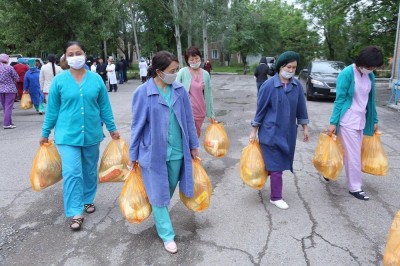
In the photo: the moment of receiving humanitarian aid from one of the political parties.
The suspension of the electoral process in Kyrgyzstan due to the COVID-19 pandemic has exposed a long-standing problem as vote buying. Political parties have started to massively distribute humanitarian aid to the Kyrgyz people, thus, according to some experts, massively violating the constitutional law of the Kyrgyz Republic "On Elections of the President of the Kyrgyz Republic and Deputies of the Jogorku Kenesh of the Kyrgyz Republic" and the Law of the Kyrgyz Republic "On Elections of Deputies of Local Councils". Such a violation occurs during all elections and negates the very idea of holding a fair popular vote.
On April 12, 2020, elections of deputies to the local councils were to be held in a number of settlements in Kyrgyzstan. However, on March 23, 2020, the decree of the President of the Kyrgyz Republic suspended the "measures to implement the stages of the electoral process" for the duration of the emergency situation regime. The authorities introduced an emergency situation regime in Kyrgyzstan due to the coronavirus pandemic.

Helping the hungry or bribing them?
The COVID-19 pandemic has made significant changes in the lives of Kyrgyz people. Most of the citizens were not ready to live in self-isolation. Having lost their jobs and daily earnings, people found themselves in a difficult situation. It was at this point that political parties began actively distributing humanitarian aid.
Social networks were littered with photos of grateful grandmothers, mothers with many children and happy children who were handed bags of food by dashing guys. The naked eye can see which party the bags were handed out from, as they were emblazoned with the logos of the new political associations participating in the election race: the photo of the Kyrgyz Liberal Democratic Party, the photo of the Social Democrats Party.

Photo from the social media page of deputy Zhanar Akaev. He is talking about assistance provided by the Liberal Democratic Party of Kyrgyzstan.

Photo from social media of the Social Democrats Party of the Kyrgyz Republic. Congratulating women on Mother's Day.
Here is the Head of the "Kyrgyzstan" party and current Deputy of the JK Kanat Isaev personally distributes the humanitarian aid to doctors.
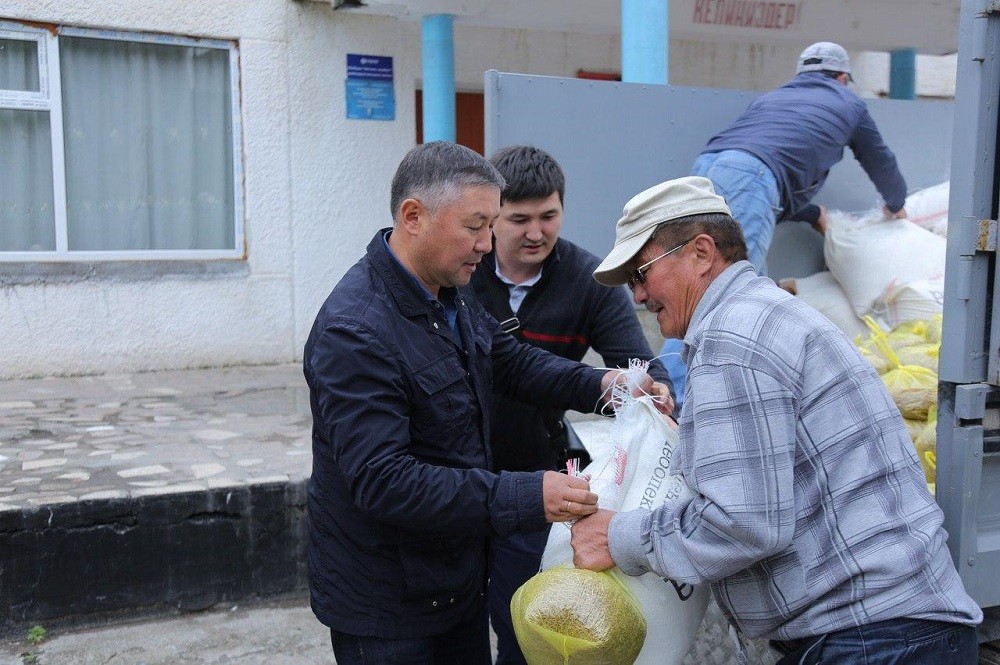
Photo from the "Reporter.kg" website. In the photo, Kanat Isaev, the Deputy of the JK, the leader of "Kyrgyzstan" party, is distributing humanitarian aid.
Activists of the "Birik" party in protective suits with the logos of this political party cleaning yards and premises.

Photo from the social media page of the "Birik" party. Photos depict the disinfection of yards and houses in the uniform with the party logo.
Members of the "Birimdik" party carefully enclosing booklets with information about their party in the bags with humanitarian products.
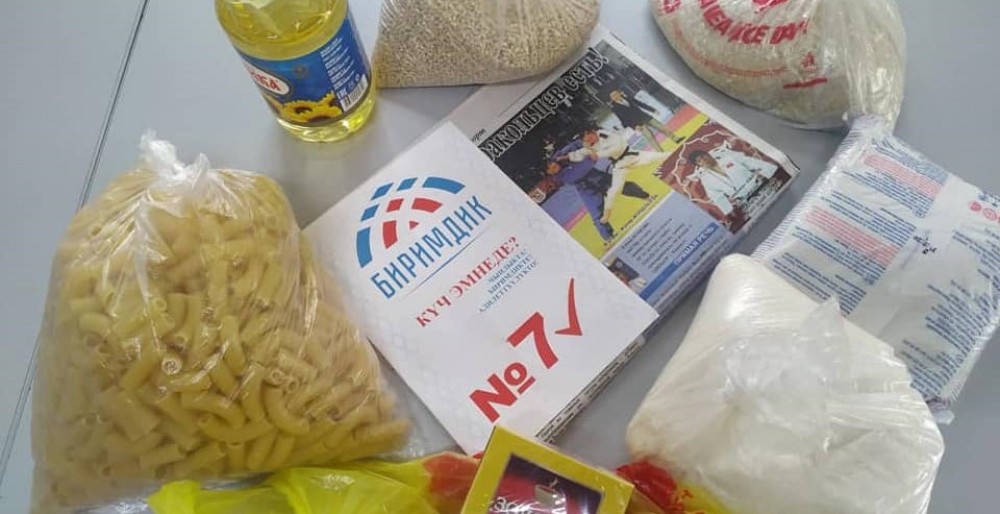
Photo by Alena Khomenko.
The Foundation of the current Deputy of the JK Ulan Primov delivering flour to the needy in bags with a logo with his name on it.
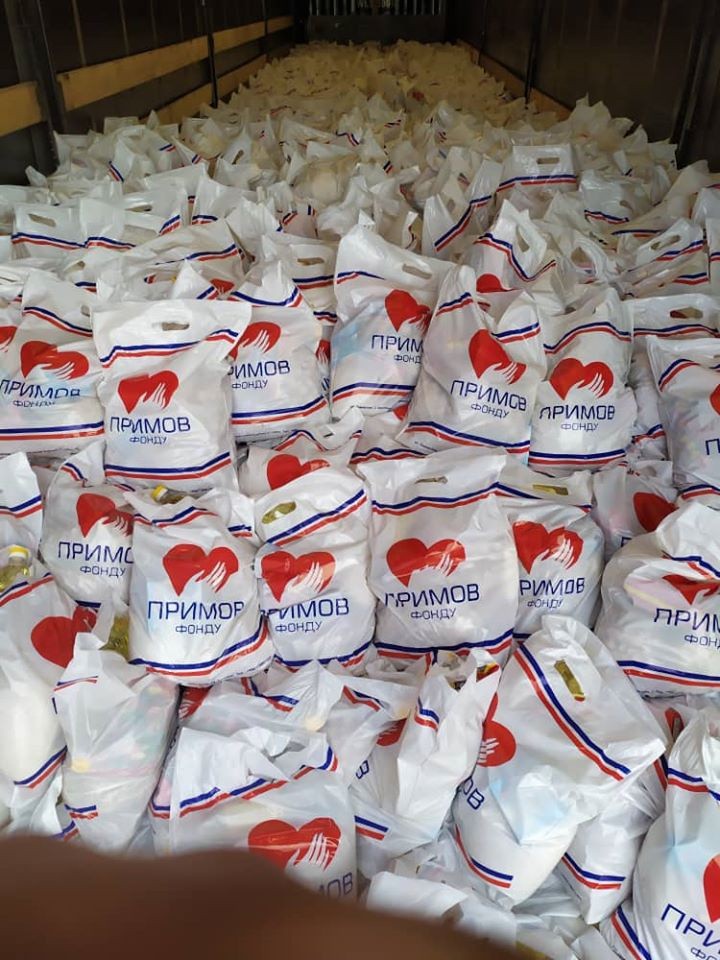
Photo from the page of the Foundation of Ulan Primov, the Deputy of the JK.
Another deputy Iskender Matraimov is posting professionally shot videos of the delivery of entire truckloads of humanitarian aid from the Charitable Foundation named after his father. The deputy every time emphasizes on his page in social media that this good deed is done by his brother Raiym Matraimov.

Photo from the social media page of the JK Deputy Iskender Matraimov. Providing tests for medical institutions in Kyrgyzstan.
Lawyer of the Common Cause PF Taalai Asylbekov reminds that on February 10, 2020, the President of the Kyrgyz Republic signed a decree on the appointment of elections to local councils in some regions of the country. In other words, the election race started in February.
"In Part 4 of Article 28 of the Constitutional Law of the Kyrgyz Republic "On Elections of the President of the Kyrgyz Republic and Deputies of the Jogorku Kenesh of the Kyrgyz Republic" and the Law of the Kyrgyz Republic "On Elections of Deputies of Local Councils", starting from the announcement of the elections and until the end, that is the pronouncement of the results, any charitable activity from candidates, party representatives and members of their families, is forbidden", - the lawyer emphasized.
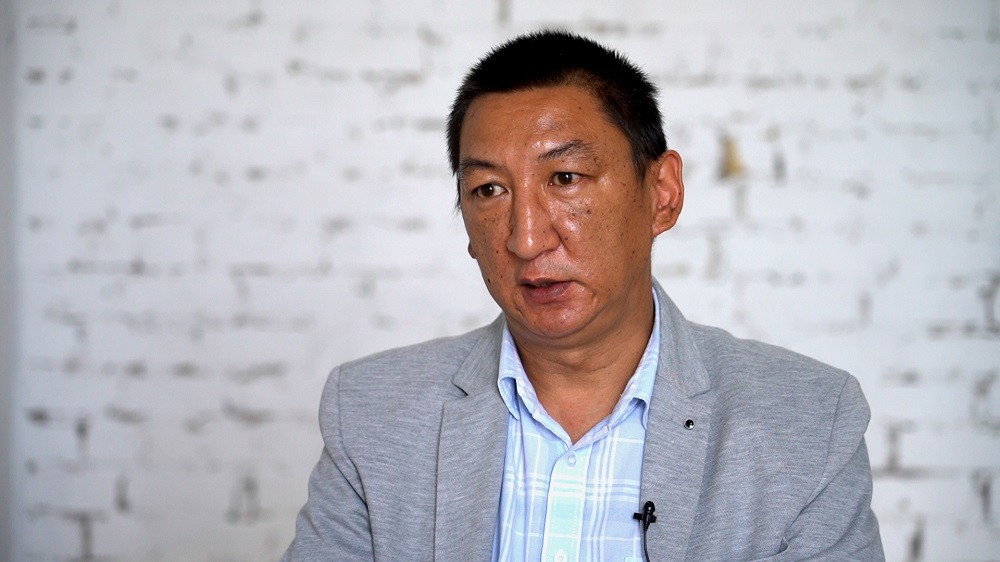
In the photo: Lawyer of the Common Cause PF Taalai Asylbekov.
A number of human rights defenders and members of the Central Election Commission sounded the alarm and stated that political parties were grossly violating election laws by engaging in charity work during the pandemic.
Atyr Abdrakhmatova, a member of the CEC, explains her position: "A presidential decree was signed on March 23 that the country introduced a state of emergency and suspended the electoral process due to the pandemic. On the same day, the CEC decided that parties are prohibited from campaigning. According to the instruction of the Central Election Commission, political parties had to remove all campaign materials and billboards that they placed in the cities where the elections to the city councils were to be held. But not all parties complied, and party billboards remained in Osh and Karakol. The mass distribution of humanitarian aid by political parties began, and some parties managed to put campaign materials in charity bags with food. Others carried out sanitary and epidemiological work in costumes with party logos. They published all this in social media. Simply put, during the pandemic, parties earned political points by taking advantage of citizens' poverty."
The "Interbilim" International Center in Osh complained to the CEC that political parties, despite the CEC's decision, continue to conduct illegal campaigning activities, distributing charitable aid.
"On April 9, after consideration of the complaint, it was decided that the distribution of humanitarian aid, the provision of services of any kind free of charge in cities and villages where elections were scheduled, is a violation. The CEC has appealed to the parties that if they sincerely want to help the people of Kyrgyzstan, they should do so through the republican headquarters. The single center has all the data of those in need, and the state will distribute the aid itself. And the parties could monitor how objectively and equally humanitarian aid is being distributed. That means, keeping an eye on the work of the headquarters, but in no way give out the bags with the products by themselves. The decision of the CEC to recognize the distribution of humanitarian aid as a violation was published on the official website and in the media. The parties were aware of this decision. And no party has appealed against it," says Atyr Abdrakhmatova.
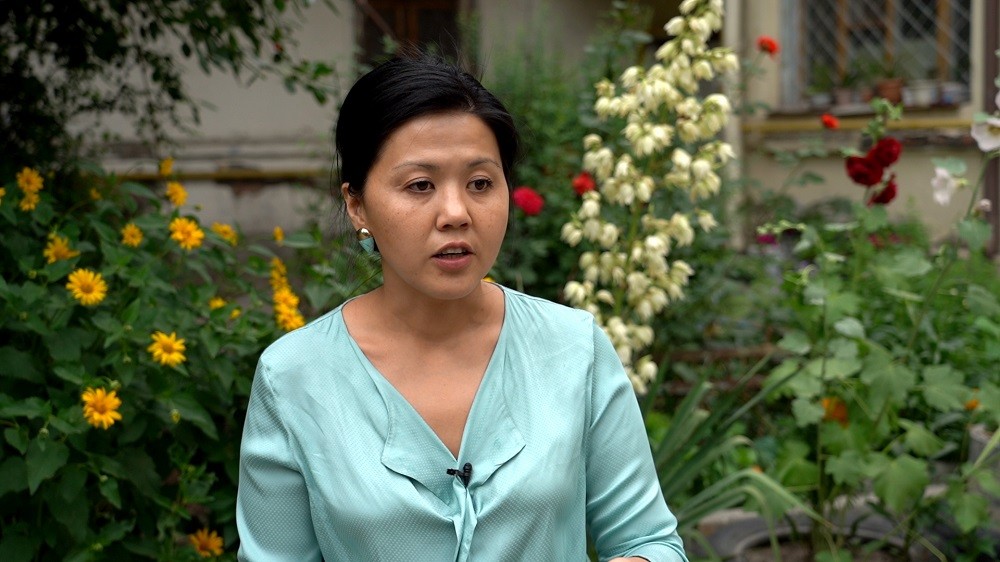
In the photo: Atyr Abdrakhmatova, the CEC member
Broke the law - get out of the race
However, despite the ban, political parties, individual candidates and current deputies continued to engage in this pseudo-charitable activity, which, according to Atyr Abdrakhmatova, is clearly a violation of the electoral law.
"Our legislation does not regulate what it means to suspend elections, how to continue them, and what should happen between these processes. Political parties and lawyers say that the distribution of humanitarian aid during the quarantine period is not a violation, because the election process was stopped, and the people needed aid. But this does not mean that taking advantage of gaps in the law, one can abuse the poverty situation in which our people find themselves. Every family was ready to accept any bag of food, because due to quarantine no one could get out of the house, work, and people were left without a livelihood. And the parties took advantage of this situation", - says the member of the CEC Atyr Abdrakhmatova.
A number of CEC members expressed the opinion in public that due to the series of violations of the electoral legislation, the CEC should cancel the registration of parties and candidates involved in the distribution of humanitarian aid.
Gulgaky Mamasalieva, the head of "Interbilim-Osh", whose organization sent a complaint to the CEC, also considers the distribution of humanitarian aid by political parties to be a violation: "On April 9, at the meeting, the CEC recommended that candidates and political parties participating in the elections, and especially deputies whose powers are suspended, should not distribute humanitarian aid. Almost all parties were engaged in the distribution of humanitarian aid. Local TEC representatives should consider complaints about these facts and decide to what extent this action is a violation and whether a candidate should be removed from the race. Parties must also be withdrawn".
Political analyst Medet Tulegenov believes that the parties have certain problems in terms of the law.
"If the elections have already been scheduled, as in local councils, then any transfer of material assets to voters can be considered as vote buying. Accordingly, a number of parties that distributed food have certain problems in terms of the law. But there is also a nonlegal aspect. Even if this is not the election period, and the parties have started to engage in humanitarian activities, this is anyway considered working with voters, so, for moral reasons, this may also look like vote buying. There is a very fine line here: from handing out food bags in person to helping build infrastructure facilities for local communities - where is the vote buying and where is the aid in solving the problems? In any case, this can be considered veiled vote buying," Tulegenov said.
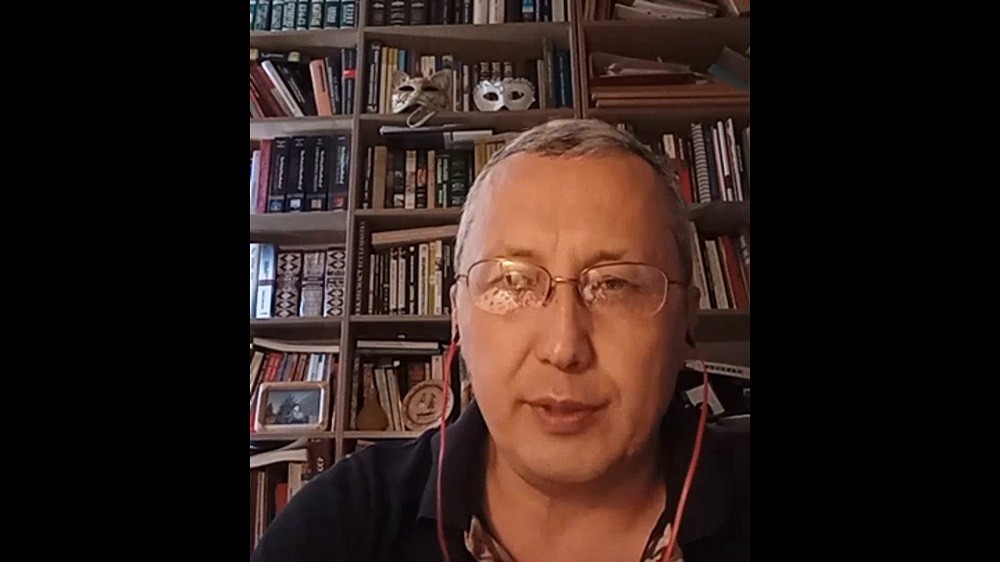
In the photo: Political scientist Medet Tulegenov.
Gulgaky Mamasalieva's opinion is the same: "From the moral point of view, these actions are pressure on voters precisely when they were in dire need of help and in an extreme condition. I would call it speculation and the use of the extreme condition of voters. From a moral point of view, this is bad, which is why we suggest that the CEC postpone the elections to local councils for another term, the next year. So that elections are not held during a pandemic. This is because the distribution of humanitarian aid took place in all settlements where elections are scheduled."
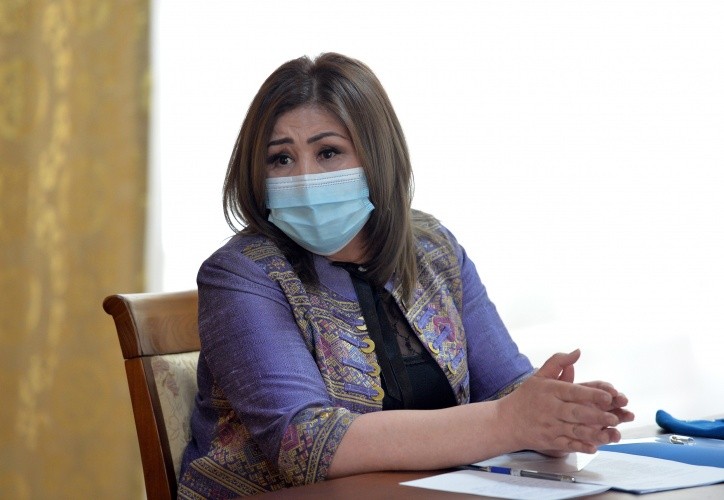
In the photo: Gulgaky Mamasalieva, the head of "Interbilim-Osh".
"This is nonsense!"
Temirlan Sultanbekov, the representative of the Social Democrats Party, called a nonsense the proposal of some CEC members to remove political parties that distributed humanitarian aid during the pandemic from registration for elections or even refuse to register them. This new party was quite active in helping the poor during the pandemic.
"According to the law, it is forbidden to campaign from the day when the President signs a decree on the appointment of elections. Before signing, all political parties can actively engage in their activities, including charitable ones. The election race was suspended due to the pandemic. As for the semantic point of view: political parties in Kyrgyzstan should cease to exist as electoral groups that gather only on the eve of elections. Political parties must be able to work as institutions on a daily, continuous basis, not just during elections. Therefore, the fact that parties are able to mobilize their resources and provide assistance to the population even without elections should be considered a positive fact. On the contrary, it is encouraged everywhere and by all countries. Distribution of food by our party was not a PR action, it was an aid to the population, because the state could not cope with it," Sultanbekov believes.
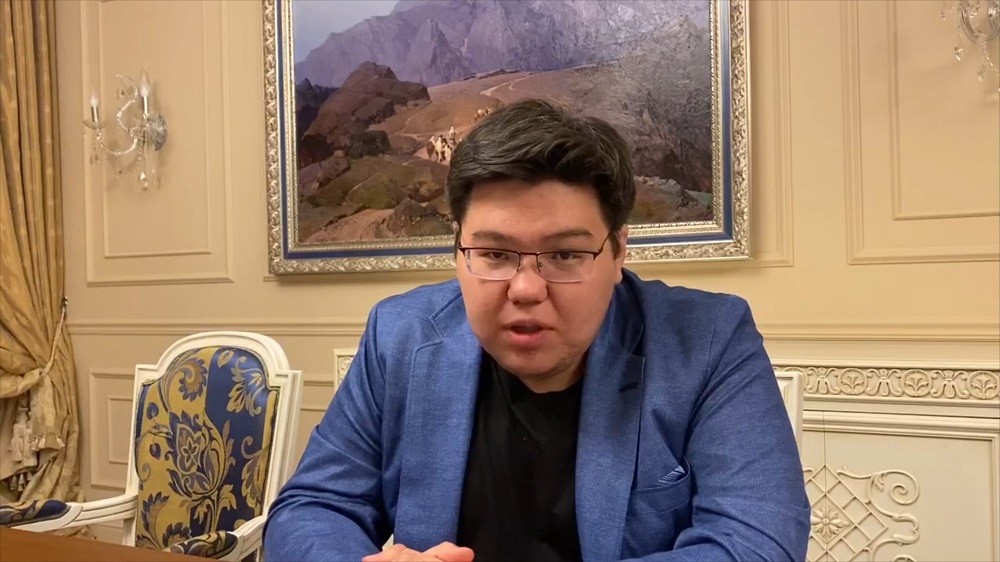
In the photo: Temirlan Sultanbekov, representative of the Social Democrats Party.
Dastan Bekeshev, acting member of the JK, holds the same opinion: "Such actions are not bribery, because the election campaign was suspended. So now, if the parties will go and hand out humanitarian aid, it will not be vote buying. It is considered vote buying when such actions occur during the pre-election campaign, during the election campaign, from the date of election appointment to the election day. But there was a decree suspending pre-election activities. And this is now an ambiguous legal situation. Therefore, any competent lawyer will prove that there is no vote buying from a legal point of view."
"People are grateful for any help!"
The household supervisor of one of the houses in Bishkek, Nasipa ezhe, does not deny that in the run-up to each elections, political parties somehow participate in improving the yard.
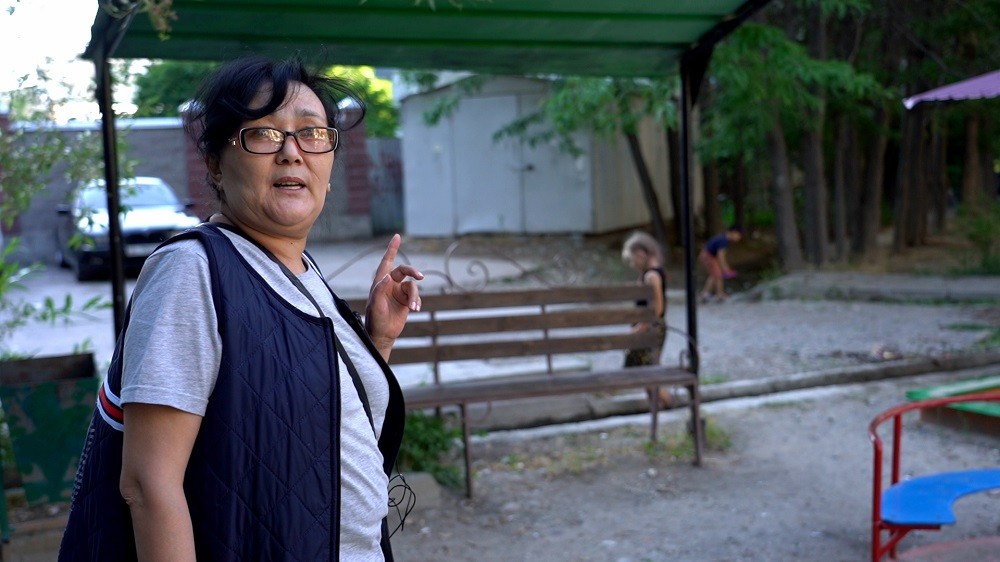
In the photo: Nasipa ezhe, the household supervisor, shows a bench set up by one of the candidates in the last elections.
"Political parties start helping just before the elections. But we are happy about it anyway. Before the last presidential elections, two benches and a carousel were installed on the playground for us.. And before the parliamentary elections they painted the swing and put the litter bin, - says Nasipa ezhe. "I don't think it's a bribe. Let them help at least this way. Because when they become deputies, where will we find them? We, the household supervisors, run around, we work, and this is at least some bit of help. We actually have no money for such expenses."
Household supervisor said that during the quarantine due to the coronavirus pandemic, one of the deputies of the city council handed out food bags to the poor.
"The bags were very decent. There were 10 kg of Russian flour, macaroni from durum wheat, produced in Kazakhstan. There was also sugar, tea, condensed milk. Many of our residents, who lost jobs due to quarantine, received such bags. In addition, the deputy allocated money for medicines for pensioners. People are happy to get any help. I know that different parties and candidates provide such assistance to each house throughout the microdistrict, " says Nasipa ezhe.
She admits that this assistance implies that household supervisors will campaign for these parties, but she does not.
In villages, before the elections, candidates slaughter sheep, promise to repair the electric transformers, but in the end they change bulbs at best. And it should be noted that this time the parties limited themselves to distributing humanitarian aid, refraining from concrete and realistic measures to overcome the crisis.
Vote buying is a long-standing practice
In Kyrgyzstan, as in the entire former Soviet Union, vote buying, distribution of humanitarian aid, and repair of public facilities have long been associated with pleasant moments for the electorate in any election.
"The issue of replacing transformers and light bulbs, which emerges in the run-up to the elections, is not new. This practice has been used for many years to collect votes. And it should be understood that this involves both parties and voters. Let me explain: there is a part of the population that does not have a very good financial situation, a low level of prosperity, and this is good for the parties. This is why such a long-standing practice of vote buying has emerged and is in effect," says Aida Suyundueva, Chairperson of the Board of the Common Cause Public Foundation.
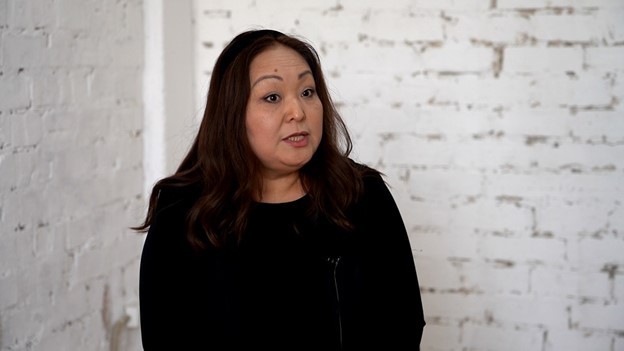
The Foundation plans to monitor elections in three cities: Karakol, Osh, and Tokmok.
"We are interested in this topic for the most basic reason: our project conducts nonpartisan observation of elections. And their implementation depends on many factors that affect the result that all parties to the election process will be happy with. The level of further confidence in the Parliament, the city or village council depends on what methods of agitation and persuasion are used by political parties, how they work with the electorate," says the head of the Public Foundation.
According to Suyundueva, one shouldn't negatively assess the provision of assistance to the population with low income level. There is a positive element in the very act of providing assistance. However, not everything is so unambiguous.
"Members of Parliament often state that they are approached by voters with a request to provide financial assistance, to resolve issues of local significance or of social nature. In other words, the population in the regions turns to the deputies of the Parliament for help in solving local issues, while they should be addressed to the local authorities. In fact, such appeals do not go unnoticed, and deputies understand and see that there is a demand for such interaction between voters and deputies, they take it into account, respond to requests, thus forming not the most constructive practice of working with voters. And there is another part of the electorate that is frustrated by such actions on the part of deputies. Why? This is the most progressive part of the population of our country, which understands the powers of members of Parliament, that they must solve national, strategic issues. Thus, there is a situation when, on the one hand, politicians meet local needs, and on the other hand, they cannot fully meet the expectations of citizens who think globally," says the head of the Common Cause PF.
According to the observations of Aida Suyundueva, the public has recently been quite critical of the work of the Parliament.
"Perhaps because of the quarantine or because of the deterioration of the financial situation of households, the general economic downturn, citizens began to pay more attention to the work of the Parliament and the actions of individual deputies. The question of the oligarchization of the Parliament started to be raised and discussed more and more frequently. In other words, more attention is being drawn to the fact that only rich parties can win and pass a high electoral threshold, that not every party can compete for votes in a fair competition. These discussions only prove the fact that there is a demand for change in society, maybe even a request for the status quo to change.
Our Foundation “Common Cause” is interested in how much money is spent on providing material assistance to the poor through party channels, what are the sources of party funding, and how the practice of distributing humanitarian aid and other local assistance helps parties solve long-term issues of party building. Another important question that we are asking is why parties are not engaged in party building on a systematic basis, during the inter-election period. What prevents parties from using other methods of campaigning, which by world standards have a perspective and an effect. We have a number of questions, and we need to understand that only through research can we reach the level of progressive recommendations," says Aida Suyundueva.
According to CEC member Atyr Abdrakhmatova, even now, observing how actively the parties distributed humanitarian aid, how a mass residence registration of voters before the elections happened, we can say that the election results will be distorted.
"We must understand one thing: if the government is elected this way, then tomorrow it will tell the voter:" I paid you, I bought you food, I got you registered illegally, so we are even. Now I will do whatever I want." And in the next 4 years, the deputies will be completely detached from society, they will make decisions of any kind, lobby the interests of their business, their relatives, turn a blind eye to the illegal distribution of land, won't solve the issues of the development of the city, village, and they will only serve either oligarchs, or administrative resources, or personal enrichment interests. This leads to such election results, this kind of politicians come to power," Abdrakhmanova said.
At the same time, political scientist Medet Tulegenov notes that over the past 10 years, electoral technologies in Kyrgyzstan have improved with each election with the aim of achieving greater transparency of the electoral process: electronic vote counting, revised voters' lists.
He believes that vote buying has increased because fraud at the level of vote counting has become less possible, so the voter has become more important. Tulegenov said that "increasing the role of the voter is, on the one hand, a good trend, but, on the other hand, it brings sad consequences – the growth of vote buying."
"The danger is that vote buying continues to develop the clientelism system, when parties give something tangible, and in return they ask for votes. Such a system takes the election process away from the main things, first of all, from discussing what exactly elected deputies and parties should do. Whereas they should be engaged in the development of the country, the development of programs, and here everything comes down to some material things, transactional exchanges: you give me something, and I give you my vote. By this relationship of a voter and a candidate the future of a deputy comes to an end. Which, in principle, is wrong," the political scientist believes.
The Parliament of bazarkoms
The current sixth convocation of the Parliament of Kyrgyzstan is popularly called the Parliament of bazarkoms. Deputies, of course, were offended by such epithets, but if we analyze the official biographies of deputies of the JK posted on the official parliamentary website, most of them are really businessmen.
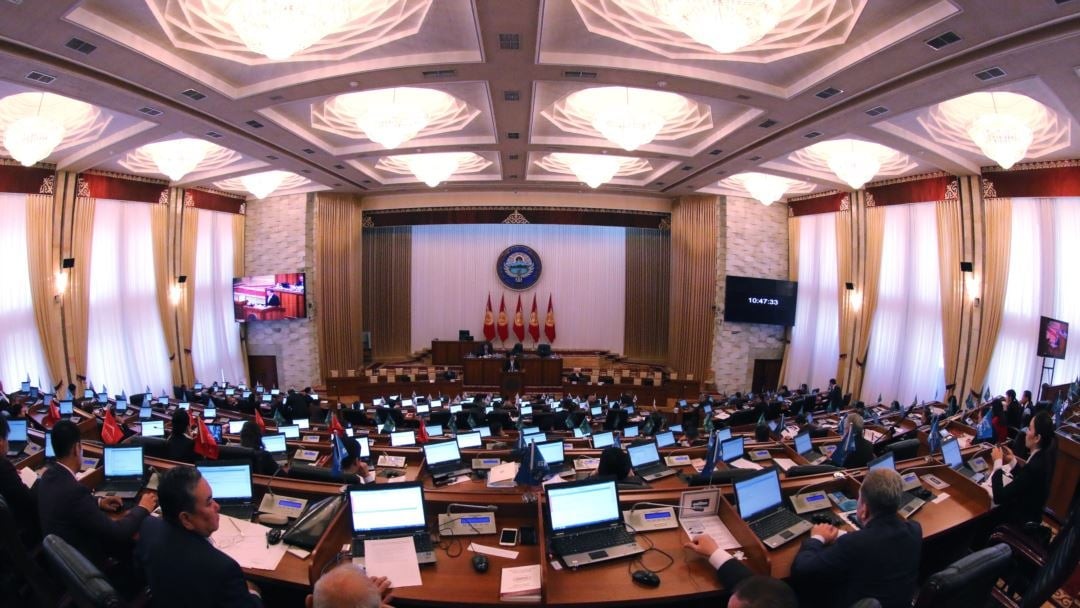
For example, out of 38 deputies of the SDPK – 15 are businessmen. Out of 27 deputies of the "Respublika–Ata Zhurt" party – 12. In the "Kyrgyzstan" party, out of 18 – 8 are businessmen. Out of 13 deputies of "Onuguu-Progress", 7 are businessmen. In the "Bir-Bol" party - 2, and in "Ata-Meken" – 5 are businessmen. That is, more than one-third of the deputies are businessmen, and most of them are engaged in trade.
According to experts, this composition of the Parliament came to power through various violations, the major of which were vote buying and the use of administrative resources.
For six years, the parliamentarians of the current convocation demonstrated full submission to control of the presidents, first Almazbek Atambaev, then Sooronbai Jeenbekov. In recent months, these deputies have initiated a number of unconstitutional laws - amendments to the Law "On NGOs", the Law "On information manipulation". These initiatives have caused strong criticism of civil society; experts and journalists called them “antipopular", but the deputies do not seem to hear the opinion of the people. On June 25, late at night, the bill "On information manipulation" was passed by a majority vote. A number of statutory enactments and articles of the Constitution were violated during its adoption. These facts show that there are interested parties in the government to approve these antipopular laws.
How to stop the vicious practice of vote buying?
Even now experts predict that the upcoming elections will be the most "expensive" in the history of Kyrgyzstan.
"More and more resources are necessary for political parties to be competitive. And this process is observed all over the world. If the level of competition among the parties is high, then the parties will start paying attention to the quality and content of their programs, plans for their implementation, will be ready to be responsible for the fulfillment of their promises, will develop measurable indicators of the success of programs, and voters can re-check them in the future. In Kyrgyzstan, the focus is still on the amount of financial resources, but we need to understand that in the current conditions, with the development of technologies and access to information resources, this is no longer enough. The society has formed a high-quality demand for fresh faces in politics, in the economy, in everything that requires fundamental changes. People want to see real changes, but they don't. And political parties do not meet such a request, which appeared only yesterday,” says Aida Suyundueva.
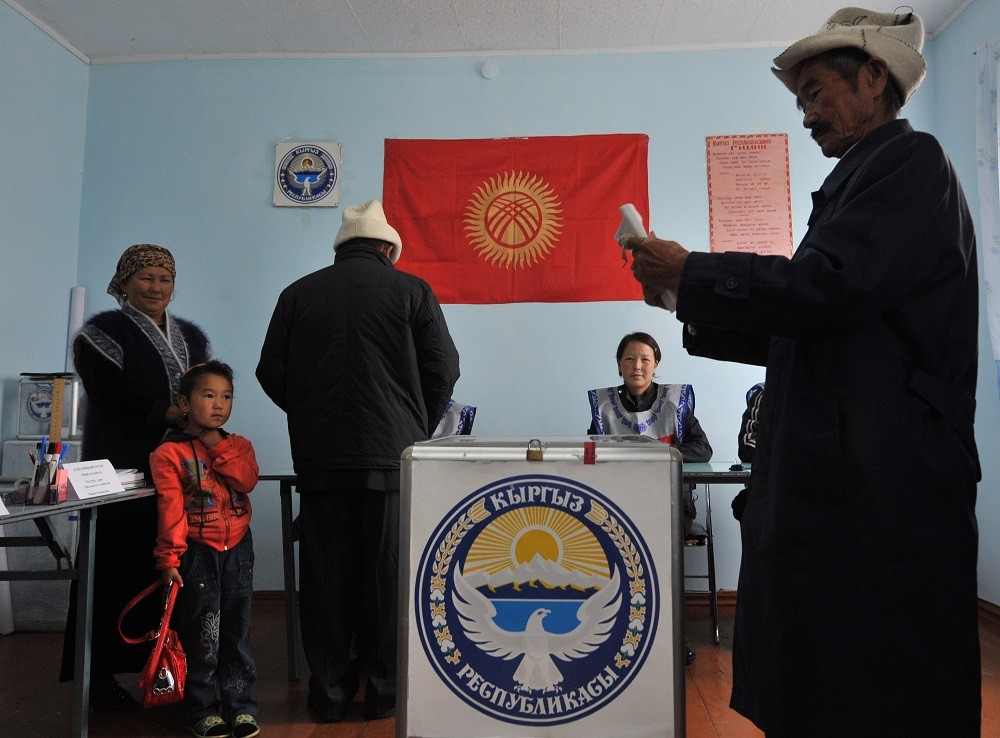
In the photo: The moment of voting in the 2015 elections.
In her opinion, 2010 can be considered the beginning of party building in Kyrgyzstan. It is the starting point of the process of forming political parties as institutions and organizations that should compete with each other.
"We are at the very beginning of defining the party process. We see a lot of criticism of it, but it is important to make this remark: in any electoral system that we choose and apply, we will still need political parties whose programs will be filled with high-quality solutions and measurable indicators, " Suyundueva believes.
Political analyst Medet Tulegenov believes that it is still unknown when and how the problem of vote buying will be solved.
"Someone hopes for the growth of self-awareness. Someone hopes that people will take money, but will start voting fairly. And then it will become less profitable for parties to invest money, because it won't be known whether the results will be guaranteed. But this is a complex and long process. Right now, it is impossible to predict how many election cycles will have to pass in order for the election process to move a little to a different plane. Especially when voters approach the sale of votes rationally: "I do not influence the fate of the election, but money means something to me." And when everyone thinks so, there is such a mass phenomenon. But if the voter will see that he/she has a choice, not in terms of money given or not be given, but will see real candidates or interesting parties, then perhaps the role of money will be minimized. The situation will move from the dead point when we see real competition, some interesting ideas and vision of the future. Then something in the minds of voters will change, they will attach less importance to the money, " said political analyst Tulegenov.
According to the CEC member Abdrakhmatova, as long as the administrative resources are used in the elections, there will be vote buying. "When the government pushes its candidate through the use of its levers, its people in power, those who run alternatively will try to excel and find other ways to win the election. But so far, the only thing they're capable of is vote buying, rather than winning voters with their ideas and programs. They're choosing the easy way. Therefore, until we deal with the use of administrative resources, the vote buying will continue. It's like a couple that spoils all the election results," - says the CEC member Abdrakhmatova.
The Common Cause Public Foundation drew attention to the fact that in accordance with Part 1 of Article 7 of the law of the Kyrgyz Republic "On election commissions for elections and referendums in the Kyrgyz Republic", the CEC monitors the implementation of the electoral legislation. According to Part 2 of Article 7, the CEC has the right to apply to law enforcement agencies with a request to conduct an appropriate audit and prevent violations of this Law on electoral legislation.
Based on this, the Foundation considers it necessary for the CEC to strengthen control over the actions of political parties in distributing humanitarian and other material aid, and, if possible violations are detected, take measures in accordance with the legislation of the Kyrgyz Republic. It is also recommended, if necessary, to submit materials for consideration to law enforcement agencies, with the idea of conducting a check for the presence of crime elements in the transfer of humanitarian aid, if there is intent of vote buying.
Independent experts and observers are convinced that the desire of political parties to provide aid to the poor can, of course, pursue humane goals, but this action can be traced to the intention to influence the outcome of elections through vote buying. The actions of political parties when working with voters should be aimed at explaining the programs of political parties. In this regard, the Common Cause Public Foundation calls on citizens to participate in the elections, be more focused on the programs of the parties rather than on the distribution/receipt of the humanitarian aid.
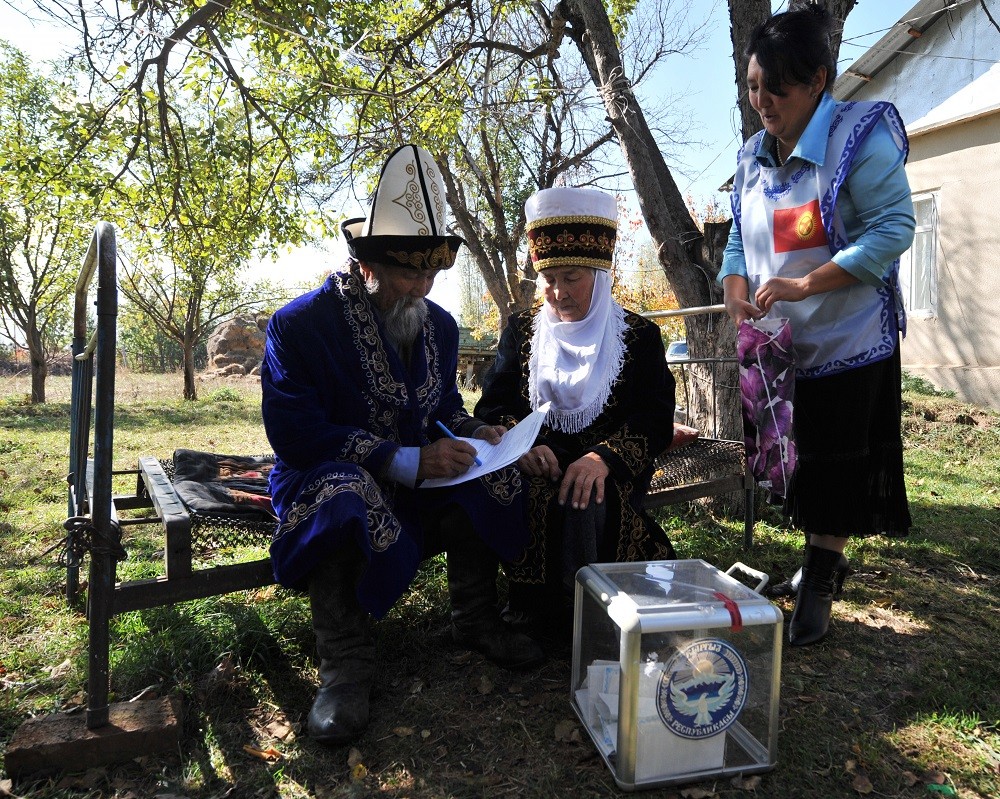
In the photo: The moment of remote voting in the 2006 elections.
The problem of vote buying, as well as the use of administrative resources, has always been present in elections in Kyrgyzstan. For example, at the dawn of the 90s, the first President Askar Akaev said to Kyrgyzstanis in one of his speeches: "If someone gives you money, take it, if they feed you, eat it. But on election day, in the booth, vote for whoever you want." Two decades later, Deputy Altynbek Sulaimanov from the "Bir Bol" party practically repeated Akaev's message, specifying: "Votes should be sold for more money, not for a thousand, but for 20 thousand soms."
The situation with the suspension of the electoral process due to the coronavirus once again exposed the problem of vote buying and possible pressure of administrative resources.
Judging by the zeal with which the current deputies started to distribute humanitarian aid, they plan to return to Parliament again. And if one considers their experience in vote buying in previous elections, it is quite possible that they will succeed. The people see these attempts and accept them with favor. So far in the history there has been no precedent for any party or candidate to be brought to criminal or other liability for vote buying. Thus, from year to year, vote buying seems to be legalized in Kyrgyzstan.
It is still unknown which decision the CEC will make regarding those parties and candidates who managed to distribute humanitarian aid and even documented these facts in social media. It is obvious that the current elections will be an indicator of whether the Kyrgyz people are politically mature enough to make responsible decisions without vote buying, and whether the authorities are ready to take decisive measures against violators of the law.
Leila Saralaeva
The "New Faces" Publication thanks the Common Cause Public Foundation for its assistance in preparing the material, as well as all the experts who shared their opinions because they care about the future of our country.









